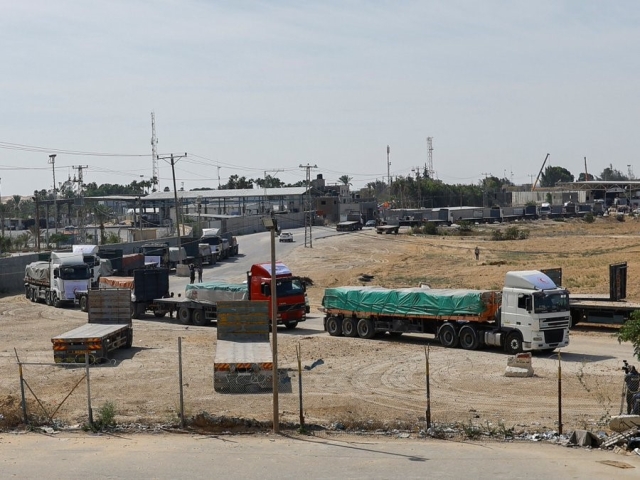On Saturday, a convoy consisting of approximately 20 trucks loaded with humanitarian aid made its way into the Gaza Strip from Egypt, passing through the Rafah border crossing. This development unfolded against the backdrop of hundreds of Israelis still being held by Hamas.
A report in The New York Times highlighted that despite Israel's insistence, there was no thorough inspection of the contents of the trucks entering the Gaza Strip. Shortly thereafter, in conjunction with a firm denial from Israel, the report mysteriously vanished from The New York Times website.
The Israeli coordinator of government operations provided an official statement, noting, "At the request of the American government, humanitarian aid comprising only water, food, and medical supplies was delivered to the southern Gaza Strip today via the Rafah crossing in Egypt. All the equipment underwent rigorous inspection before entering Gaza. We wish to underscore that Israel possesses the capability to ensure that only the specified items are allowed through."
Footage of the first aid truck that returned to the Egyptian side of the Rafah Crossing after unloading humanitarian aid in Gaza. Their happiness is so heartwarming alhamdulilah pic.twitter.com/gs3lRUa3d4
— farida (@ridaahmx) October 21, 2023
This humanitarian aid initiative was prompted by President Biden's call during his visit to Israel. He appealed to Israel to permit aid to reach the Gaza Strip, stating, "Hamas shows little regard for the well-being of the Palestinian people. We are collaborating with Egypt and other stakeholders to expedite the delivery of aid. Israel is not only a Jewish nation but also a democratic one. We hold the sanctity of every citizen's life in high regard, and we will not yield to the terrorists."
A senior official within the Israeli security establishment, commenting on the humanitarian aid convoy's arrival through the Rafah crossing, asserted, "There is no humanitarian crisis in Gaza; there are only challenges." The official went on to explain that "approximately 700,000 Palestinians have relocated from the northern Gaza Strip to the south, with around 350,000 residents still remaining in the north, including Gaza City, the Shati refugee camp, and Jabalia."
BREAKING: HUMANITARIAN AID TRUCKS PASS THROUGH EYGPT AND ENTER GAZA pic.twitter.com/KOarAm0wjN
— Sulaiman Ahmed (@ShaykhSulaiman) October 21, 2023
He continued, "There is an ample supply of water in the Strip, along with sufficient food for the upcoming weeks and a continuous influx of medical provisions. Many of those who chose to stay in the northern Gaza Strip have moved from their homes to hundreds of designated shelters. Hamas is actively working to retain the population in the northern area." The senior official clarified that even during military operations, the Mawasi area, located in the southern Gaza Strip near the sea and designated by the Israeli Defense Forces as a humanitarian zone, will be treated as such. "We will maintain this operational approach," he emphasized.


